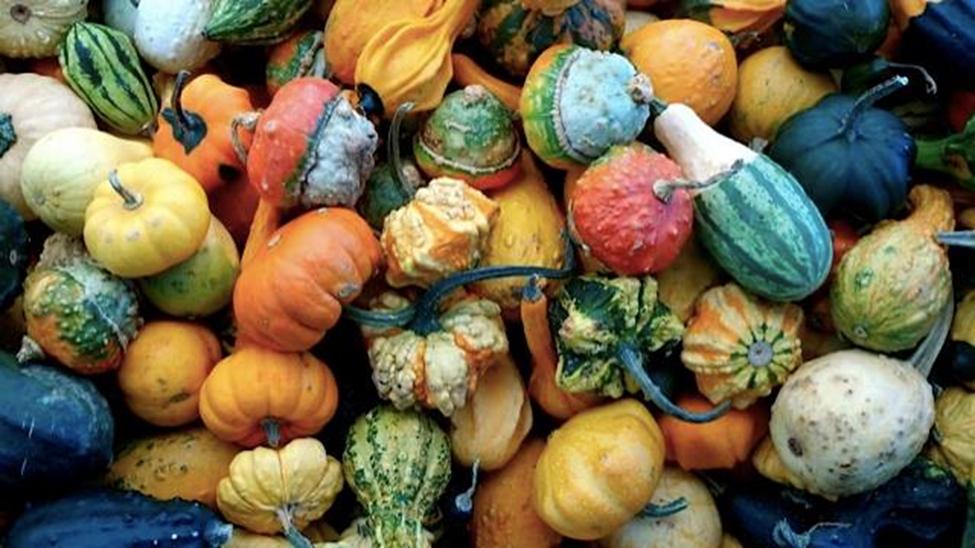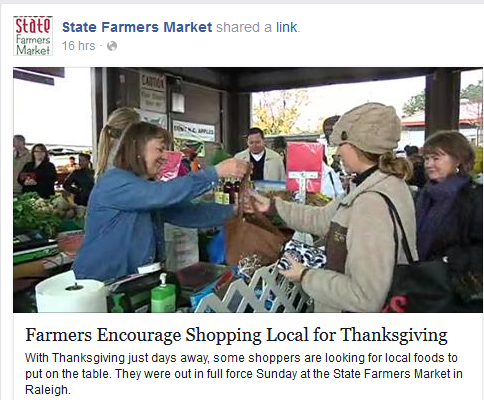Related Posts

Gourds at the Carrboro Farmers Market, photographed by Johanna Kramer, who blogs at “DurhamFoodie,” and is the author of the Food Lovers’ Guide to Raleigh, Durham & Chapel Hill: The Best Restaurants, Markets & Local Culinary Offerings.
There was a pre-Thanksgiving story on NPR this week about a grateful heart’s being a healthier heart. The conclusion was based on a study, published earlier this year, involving patients with asymptomatic (Stage B) heart failure. Researchers asked patients in one study group to write down three things for which they were thankful most days of the week for eight weeks. Both groups continued to receive regular clinical care during that time.
“We found that those patients who kept gratitude journals for those eight weeks showed reductions in circulating levels of several important inflammatory biomarkers, as well as an increase in heart rate variability while they wrote. Improved heart rate variability is considered a measure of reduced cardiac risk,” said lead author Paul J. Mills, PhD, professor of family medicine and public health at the University of California at San Diego. “It seems that a more grateful heart is indeed a more healthy heart, and that gratitude journaling is an easy way to support cardiac health.”
From improved mental health and greater self-esteem to better performance for athletes and enhanced resilience, gratitude seems to have benefits that go beyond what was known even a few years ago (Forbes.com). And, as I wrote in a blog post last month, gratitude is related to greater resilience when faced with life’s inevitable, painful traumas and losses, which are part of the human condition. Gratitude indeed may be good for the heart, soul, mind and human condition—and that makes Thanksgiving a time of even greater meaning. It’s a time to be, for some number of hours, completely in the present rather than focused on Black Friday and the ever-lengthening holiday lists of must-dos and to-dos. As humans in a fast-paced modern society, we seem to exemplify what Marie Curie wrote: “One never notices what has been done; one can only see what remains to be done.”
As I look around the Gillings School every day, I see what has been accomplished as a result of the amazingly productive faculty, staff and students who are making huge advances in what we know and do to improve the public’s health. Read our School’s weekly e-news, and it is staggering to realize on how many different fronts our faculty, staff and students are making dramatic progress. Just yesterday, we learned that one of our faculty members, Alexandra Lightfoot, PhD, research assistant professor of health behavior, was recognized by the American Public Health Association with the Tom Bruce Award for her community-based research, and Stephen Hursting, PhD, professor of nutrition, was awarded a prestigious Outstanding Investigator Award from the National Cancer Institute. While these are remarkable, there are so many more stories of accomplishment.
As dean, I also know many of the personal stories of suffering and sadness experienced by our faculty, staff and students and the people they love and care about—serious, and sometimes life-threatening, illnesses, grievous losses, fears, disappointments and yes, sometimes, failures. So many times, I emerge from our conversations awed by the dignity, decency and resolve with which people go on, continuing to teach, mentor, study, conduct research and attend to their work. We also share moments of triumph and joy and the energy and excitement of goals achieved, recognition received and milestones met.
For my part, I am grateful to be part of this community of caring, dedicated people who are making the world a healthier, more compassionate place. While we should be grateful for so much, we also must recognize that whatever we have, however much we might lack, it is far worse in so much of the world and even in parts of our city, state and country. Violence lurks around the corner, as the horrible events in France showed, and inequality threatens our country and world and causes fissures that sometimes seem to undo progress in diversity and inclusion. We must find ways both to be grateful for how far we have come and also to see the world through the eyes and hearts of people who continue to experience unfairness, injustice, brutality, neglect and inequality.
I’m grateful to all those who make the Gillings School ever better and stronger—and the state and world healthier.
Best wishes for healthy, happy and truly enjoyable holidays! Be safe in your travels.
Barbara
PS: There’s something else for which to be thankful—our many wonderful farmers markets. Triangle area markets have a consolidated Web page for easy access to information on 11 local markets, including ones in Carrboro, Chapel Hill, Durham and more, that have special pre-Thanksgiving hours, mostly on Tuesday, Nov. 24.

